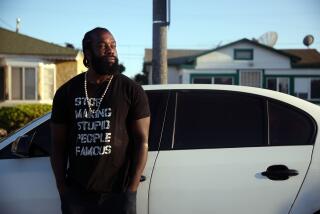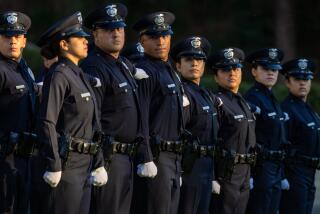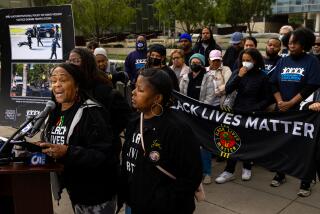Lebanon’s Traffic Cops--They Get No Respect and Very Little of Anything Else
- Share via
BEIRUT — Guns, kicks and curses are daily dangers for traffic police in Beirut, but some give almost as good as they get.
“I had to jump in front of the car to make the driver stop,” says Officer Mustafa Jendi. “The driver slapped me, I slapped him back. He drew his gun, I drew mine. He brought out a machine gun so I ran away.”
Each traffic officer has his own way to deal with offenders. Lebanon’s civil war has so weakened the legal system that it is pointless to write tickets.
Jamal Mansour says he punches the doors of the cars, Selim Saadeh leaps over the hoods, Mustafa Haj kicks the drivers and Jamil Yousef waves the traffic to a halt and then goes home.
Mansour tells of another defeat that cost the remnants of his self-respect.
“I begged him to give me his driving license because he was driving on the pavement (sidewalk). I told him it was only to save my face in front of hundreds of drivers and that he could take it back in minutes.
“He refused, telling me it was not my business,” Mansour says.
Lebanese drivers, survivors of nearly 14 years of civil war, have little time or regard for the traffic policemen of Beirut.
Paid meager wages, the officers go to work on ancient motorcycles, in dented Japanese cars or on foot.
It is common to see policemen on Beirut’s streets in the morning and evening rush hours arguing, shouting, cursing or exchanging punches with the drivers who disobey them. Occasionally there are gun fights.
Traffic policemen are accustomed to being snubbed or regarded as irrelevant in a country with thousands of Lebanese, Syrian and Israeli troops, U.N. peacekeepers and militiamen.
Armed only with revolvers, they do not pose enough of a threat to such frequent offenders as militiamen for whom only the gun is law.
The very few traffic signs left standing in Lebanon are rarely used to guide drivers. Many are plastered with posters for restaurants, cinemas, nightclubs or even death notices.
The last traffic light flickering in the capital stood in the once-wealthy Christian neighborhood of Ashrafiyeh until recently. But it was stolen, probably to illuminate a night club dance floor.
Officers say it is almost impossible to keep order on the streets of Lebanon, where few drivers abide by the rules. With 300 men and little equipment, the traffic police have an almost hopeless mission.
They use their flashlights at night as traffic lights. They carry tree branches, rocks, used tires, and garbage barrels to the side of roads to replace road signs and warn of hazards.
Many Lebanese civilians, frustrated at their own powerlessness to end the civil war, proudly tell stories about how toughly they deal with the traffic cops--the only authority they can beat.
“Whenever I don’t like a policeman I beat him up and put him in the boot (trunk) of my car and pull his mustache if he has one,” says 60-year-old Fouad Helmi, also known as Abu Al-Mouwas (father of razors).
He says the only traffic policemen he sees are usually enjoying a meal of bread and olives set on the hood of a car or smoking cigarettes and drinking coffee in cafes.
Drivers, shopkeepers and pedestrians often take the initiative themselves and direct traffic to clear a traffic jam. Militiamen know they can easily clear a way by firing in the air.
“I used to drive my children to school in a T-54 tank,” says Kamal Merheg, a militiaman in Christian East Beirut since the start of the civil war.
“My friends and I raced with M-113 troop carriers. I don’t need a traffic policeman to tell me how or where to drive.”
More to Read
Sign up for Essential California
The most important California stories and recommendations in your inbox every morning.
You may occasionally receive promotional content from the Los Angeles Times.













